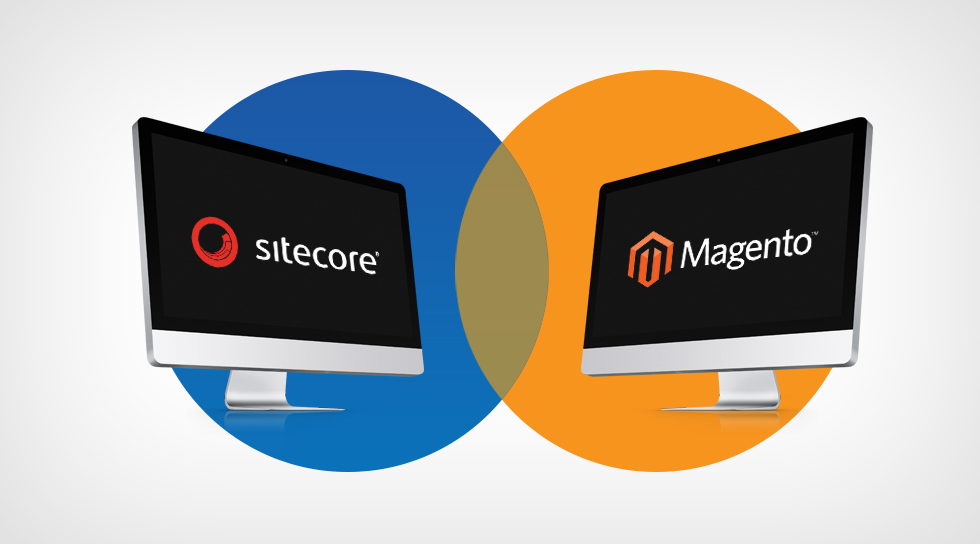You are wondering between Sitecore vs Magento 2 for your online sales website but do not know the difference between these two platforms. This article is written for you.
Customers are gradually turning to online shopping because it saves time and facilitates product evaluation. As a result, there is a greater need for companies to create distribution networks, as well as the rapid growth of e-commerce platforms.
Magento and Sitecore are two online platforms chosen by many enterprises because of their high customization capabilities and suitability for a wide range of businesses. Many companies still struggle to decide whether to use Sitecore or Magento because the two systems have many similarities.
So, what is the difference between Magento vs Sitecore Commerce, and which solution is best for building your sales channels? This article will look at the most noticeable differences to determine the best fit.
About Two Contestants: Magento Vs Sitecore
Table of Contents
Magento Overview
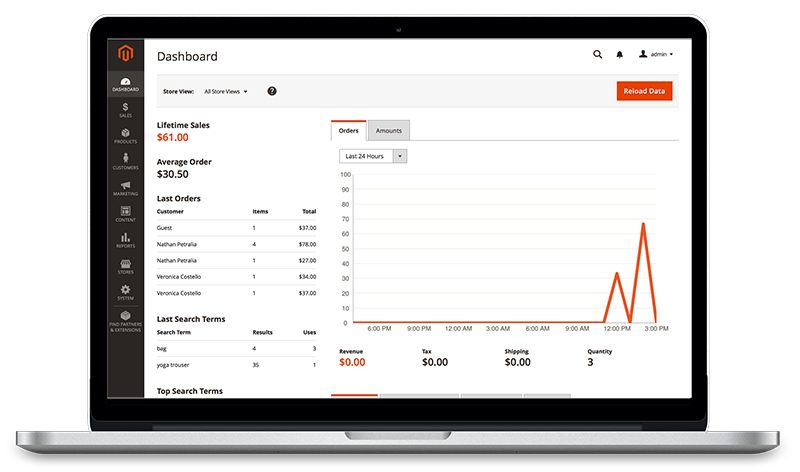
First, let’s dig into “What is Adobe Magento?”. Magento is a PHP-based open-source eCommerce platform. It makes extensive use of PHP frameworks such as Laminas and Symfony. The Open Software License (OSL) v3.0 governs the distribution of Magento source code. Adobe Inc. purchased Magento in May 2018 for USD 1.68 billion.
Magento, which comes from the developers of Photoshop and other innovative applications, offers everything you need to build and run an online store, as well as a plethora of creative extensions. That is why Magento is well-known in the field of eCommerce platforms for its scalability and customization. It is available for free as well as in a paid cloud-hosted version.
Sitecore Overview
Sitecore, a Magento competitor, is a customer experience management company that offers omnichannel marketing tools and online content management automation. The company was founded in Denmark in 2001. As an ASP.NET-based content management system, Sitecore Commerce enables users to edit web content and have complete control over all facets of the website.
Sitecore Commerce software is appreciated by both consumers and experts in the field of E-Commerce Software. The features and costs of this platform are suitable for small and medium-sized businesses (SMEs) to large corporations.
Detailed Analysis: Magento Vs Sitecore
#1. Main features
On the surface, the differences between Magento and Sitecore commerce appear to be minor. However, when comparing the features provided by these two software programs, it is evident that Sitecore Commerce vs Magento basically serves two separate business purposes.
Sitecore Commerce Features
Sitecore is much more sophisticated than any other content management system when it comes to marketing automation. It has a special function that is only for automation, which is Automated Marketing. You could use Sitecore’s integrated marketing suite to incorporate other marketing platforms into your CMS, enabling you to deliver customers content that is personalized to their individual needs.
Sitecore’s built-in analytics usage data will be used to monitor consumer behavior, helping you to tailor content with a customized experience for individuals. This will improve customer loyalty as they shop at your online store, resulting in higher income for your business.
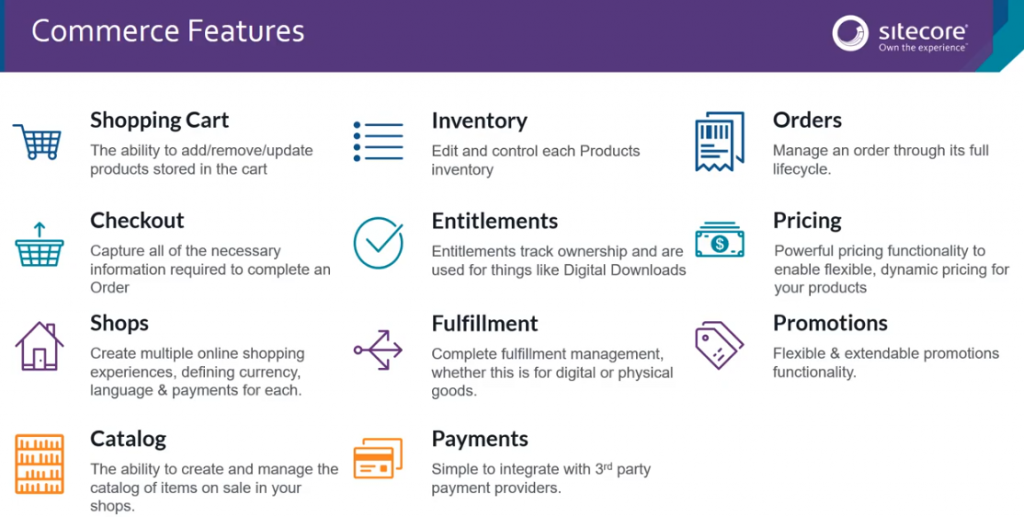
Magento Features
Magento has features that make it a perfect fit for companies of all sizes that are selling their products online:
Payment and Delivery: Payment and shipping are critical components of the customer’s purchasing path. These are two fundamental functions that are critical to all business activities. Magento default offers a lot of payment gateways such as Paypal, credit card, Stripe, etc. Regarding shipping and delivery, there are three options flat-rate shipping, table-rate shipping, and free shipping. Magento has made this simple by enabling brands to collaborate with a wide range of payment systems and shipping providers to ensure they have the best solution for their customers’ needs.
Advanced E-Commerce: Magento is without a doubt the most comprehensive eCommerce platform available on the market. There are features in the system that none of the rivals have. Magento 2, in particular, offers advanced functionality to maximize productivity in the B2B Commerce Sector. Some notable features include Company Credit and Quick Order, which facilitate payment and distribution of the inert business. Furthermore, the Shared Catalog feature enables sellers to develop customized sales pages for each consumer segment. These features make Magento 2 an excellent option for B2B companies.
LEARN MORE about why Magento 2 can provide excellent B2B Commerce service: Magento 2 Community vs. Enterprise – Don’t Use Magento until You Read This
#2. Personalization and customization

Magento and Sitecore are both at the top of the list of platforms that offer a high level of personalization.
Without further explanation, Sitecore is a customization-focused platform. Because of that orientation from the start, the deep structure in this platform’s ecosystem includes features that aid in personalization optimization. Even automated features, such as Automated Marketing tools, allow marketers to create dynamic experiences based on consumer behavior analysis. As a result, Sitecore provides a one-of-a-kind customized shopping experience that cannot be matched.
Magento is often regarded as a highly customized solution. Different from Sitecore, Magento’s customization capabilities are evidenced by its broad variety of plugins, which are made possible by its extensive connections with external systems or application partners. As a result, Magento’s customization features are not limited to this platform alone, but also to a wide range of other applications. This provides companies with a number of choices for adding to their website. Furthermore, the ability to analyze user data enables Magento to make sophisticated purchasing recommendations as well as simplify ordering and payment. This allows consumers to have a more pleasant and time-saving shopping experience.
#3. Scalability

When it comes to choosing an eCommerce site on which to construct your store, scalability is crucial. Since it is the determining factor in whether or not the platform will be able to satisfy the company’s future growth needs. In other words, scalability is a vital task that ensures the platform can be used in the long run, regardless of how the enterprise updates or switches its market direction.
Magento vs Sitecore are two of the most widely used eCommerce systems with high scalability.
The Platform-as-a-Service (PaaS) capabilities and cloud functionality of Sitecore really impress in this aspect. Sitecore offers this feature, which allows users to pay fees based on server usage at various times. Furthermore, if you want to extend your company, Sitecore has built-in utilities to make this easier rather than relying on external support features.
However, when it comes to scalability, Magento is the undisputed king. Market research and customer behavior insight are important when creating an online advertisement portal for leading and enhancing the business in the future, as well as determining the website’s scale.
Magento 2 includes software to assist you in gathering data in the most effective possible manner. It has become an unrivaled service in forecasting future trends thanks to the collaboration with external collaborators such as New Relic, DataDog, MixPanel, Splunk, and Google Analytics. This kind of data is priceless when it comes to determining the capability of different networks that can be scaled up or down. Furthermore, almost all of Magento 2’s features can be scaled up or down. This degree of adaptability is unrivaled in the industry.
#4. Content Management
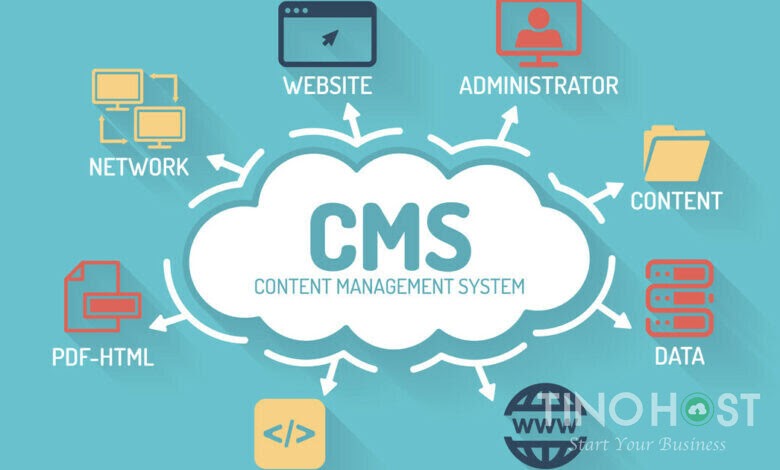
Sitecore CMS
Many people choose Sitecore as their content management system when they want to personalize and optimize their content. One of the three most prominent Sitecore features that can push it to the forefront of content management system providers is:
- SitecorexConnect API: This feature enables developers to synchronize and collect data between Sitecore and almost any other marketing or sales system, such as Salesforce or Microsoft Dynamics 365.
- Personalized Customers Data: This is a standout feature in Sitecore’s content management. PCD is similar to a filter in that it analyzes customer behavior and then automatically brings them content that matches their search needs.
- A/B and multivariate testing: Sitecore’s monitoring and review tools provide a thorough evaluation of whether the traffic channels or content are not really performing as expected. Businesses will then devise ways to boost their distribution platforms.
Sitecore is unquestionably the pioneer in CMS, but Magento – a product-based eCommerce business – takes the cake when it comes to providing CMS for eCommerce platforms.
Magento Content Management Systems
The effectiveness of every online business website is heavily reliant on the search engine friendliness of the CMS that it employs, especially in terms of content marketing strategies. Magento is well-known for its SEO-friendly features, which include:
- Sitemap generation for better indexing by search engines;
- Canonical URLs for a top-priority web page crawling;
- User-friendly URLs;
- URL rewrites for CMS pages;
- ALT texts for image optimization;
Furthermore, Magento’s collaboration with external systems such as Google Ads and Adwords is an asset in delivering Magento’s robust data sources and analytics capabilities.
A perfect CMS for content marketing should be user-friendly and simple to configure, with themes, plug-ins, and models to meet various content marketing requirements. Magento has done an excellent job in this regard as an open-source site, with its massive Magento Marketplace registry giving users full access and enhancement over their website.
As a result, when it comes to content management, both Sitecore and Magento 2 have their own advantages. However, if you are searching for a solution to create B2B or B2C eCommerce websites for your company, Magento is unquestionably the better option.
#5. Pricing Policy

The Sitecore license fee is $40,000 for the first year and $8,000 for each additional year. The cost of implementation begins at $65,000, with annual support and licensing fees of about $10,000.
Magento currently offers three pricing options for you to choose from: Magento Open Source vs Adobe Commerce, vs Adobe Commerce Cloud. Magento Open Source is available for free download and installation. However, you must also pay for your hosting, domain, and protection, as well as any web development assistance. Magento Commerce and Magento Commerce Cloud both provide a price dependent on the business’s estimated gross sales revenue per year. With an annual gross sales revenue of less than $1,000,000, Magento Commerce costs $22,000 and Magento Commerce Cloud costs $40,000. This cost can rise depending on the third-party Magento commerce extension or other services you want to use on your sites.
#6. Ease of use
When comparing the user-friendliness of Magento vs Sitecore, Sitecore is obviously superior.
Sitecore allows users to handle several massive websites with a backend program that no other platform can equal. The platform’s simple and user-friendly architecture enables even non-technical experts to create customized and functional websites.
Magento is intended for intermediate to advanced levels of web development. As a result, understanding how this platform works necessitates a profound knowledge of programming.
However, with the introduction of later Magento versions, such as Magento 2.3.2 in 2019, there have been improvements that contribute to the platform’s ease of use. Some notable steps include making the page builder content editing tool a standard feature and allowing all page management features to be accessible from the sidebar. This reduces the need for coding while building the site and simplifies content management.
As can be seen, Magento developers are working hard to make this solution more accessible to the majority of businesses.
#7. Support

Both Magento and Sitecore understand the value of support in customer loyalty. As a result, all of these sites provide thoughtful assistance.
Sitecore provides two support options. The first one is Sitecore Standard Support, which includes access to the Sitecore Support Portal and response times from 1-3 business days, depending on issue severity. The other option is 24×7 Premium Support, which provides access to the Sitecore Support Portal and response times of as little as one hour at any time of day, 365 days per year for critical issues.
Open Source Magento, the free version of this solution, has a wide support group, including DevDocs Forum and Magento, among others. In the meantime, Magento Commerce (Enterprise Edition) provides the most robust and efficient service packages, including phone and email support 24 hours a day, seven days a week, as well as live chat.
Useful Review of Developers
To provide you with the most realistic perspective on these two platforms, here are some feedbacks from developers who have used Magento vs Sitecore Commerce:
Sitecore
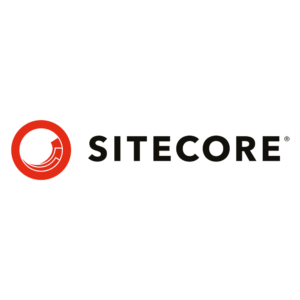
Ehigie E (Data Analyst/Quality Systems Engineer)
“I enjoyed the look and feel of the landing page and content creation. Once you understand the core of the content creation, you can truly add or remove anything within the platform and understand things at a deeper level. So Intuitive and full of potential.”
Bryan T (Senior Software Engineer)
“Sitecore does have a competent content editing Interface. While this User interface is efficient enough, several other commodities in this area seem to offer a more elegant UI for editing. Sitecore will do more to provide an incredibly simple interface for editing. It would be great to have a professionally operated Sitecore hosted rather than a cloud-only one. The price is more on the expensive side of things. Giving the cost structure a little more difficult to justify”.
Magento

Arpita R. (Administrator in Computer Software)
“The best part of this tool is that it is open source and it is easy to set up for eCommerce platform creation. it has amazing addon functionalities which make it easier to create a perfect eCommerce creation.”
Melissa C. (Administrator in Non-Profit Organization Management)
“Many features are add-ons. Some custom development may be needed. Keep in mind that this will increase the cost. Also, consider having an in-house team dedicated to customization and upkeep. If not, expenses will become quite costly.”
Besides, in case you’re considering Magento vs Shopify vs BigCommerce – three giants in the eCommerce world, read this article.
Wrapping Up…
Magento vs Sitecore are both leading platforms for offering optimal website solutions. Both systems have advantages such as high scalability, versatility, and SEO friendliness, as well as optimized content management functionality. If you are looking for a solution to create an eCommerce website, Magento found it to be a promising option. However, in order to optimize its capacity, this platform would require a greater investment in developers.
If you want to switch from Sitecore to Magento, BSS Commerce Magento 2 store migration services are here to help. With a professional team that can handle the technical complexities of the transaction and every aspect of the migration process, BSS Commerce‘s service ensures minimal downtime and disruption, allowing you to continue serving your customers without interruption.
CONTACT NOW to let us know your problems. We are willing to support you every time.
